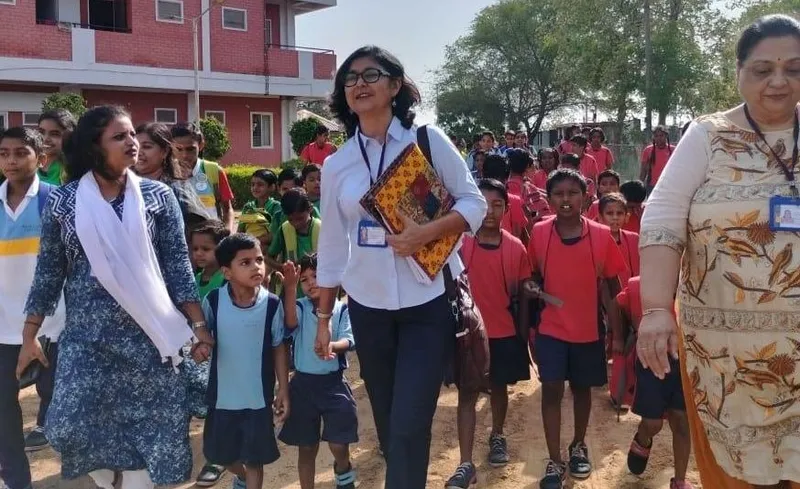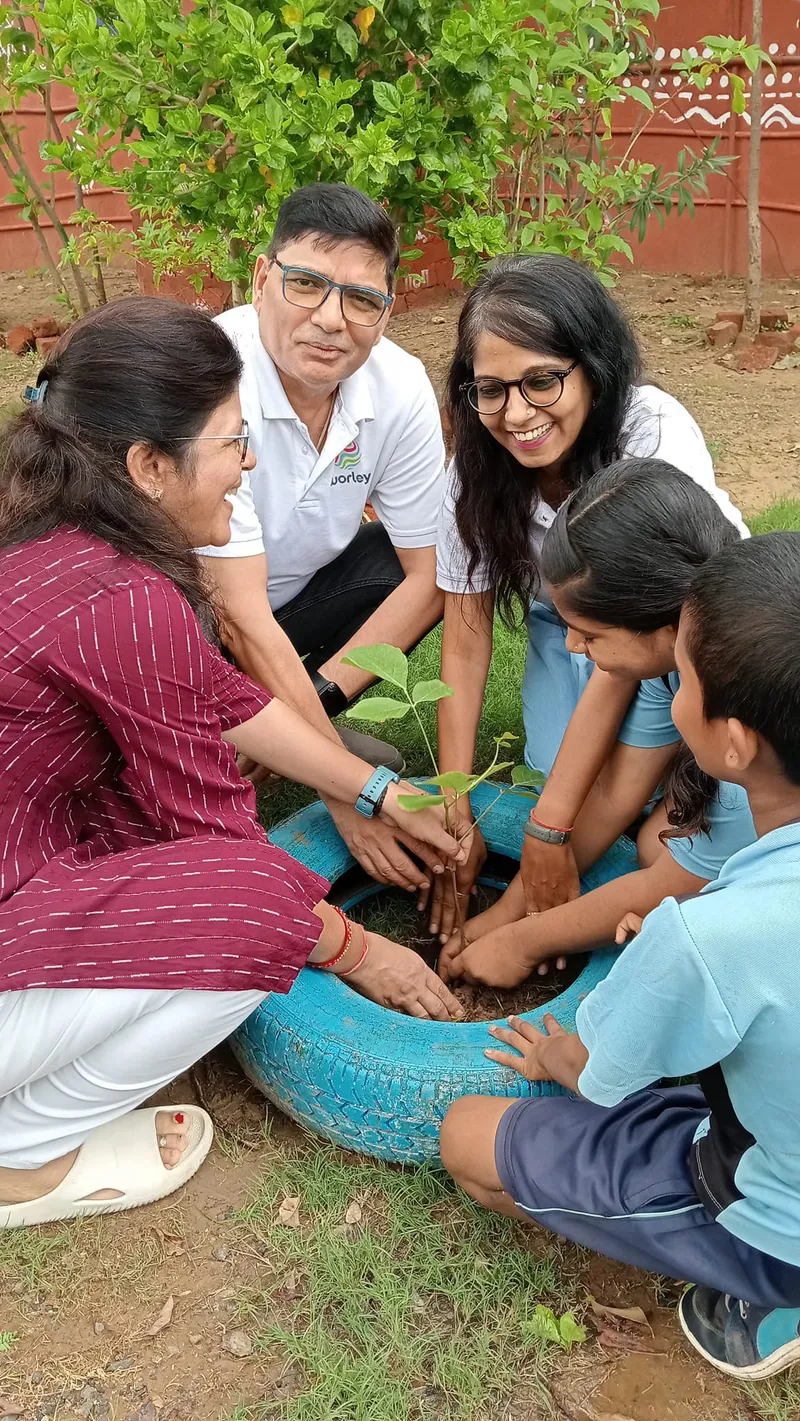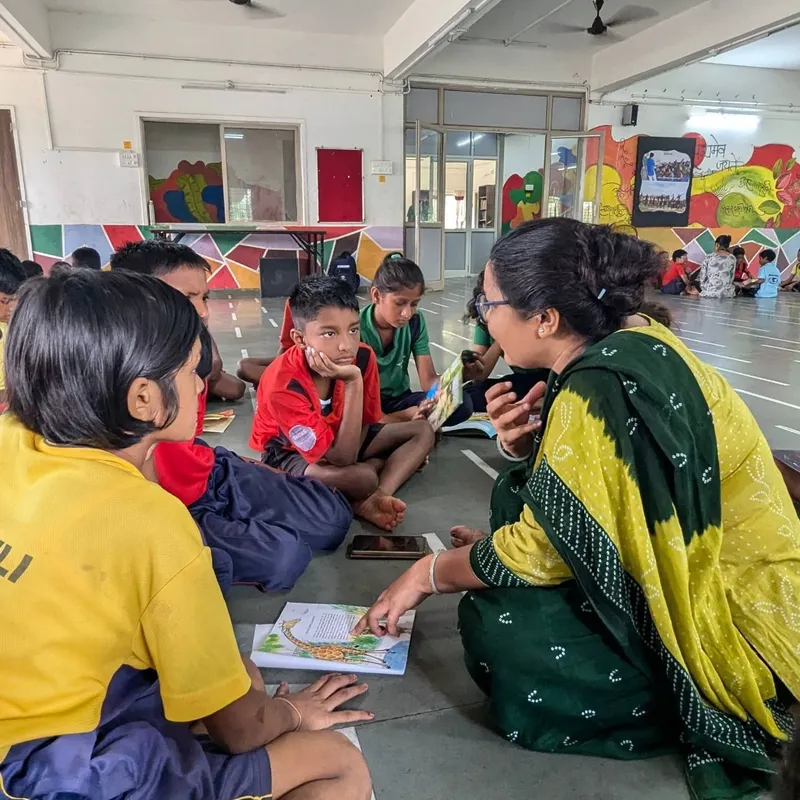This woman is providing free education and shelter to children of migrant labourers
The Pathshala project, handled by Juin Dutta, aims to offer free education and shelter to street children, children at construction sites and slums. It is currently supporting 100 children.
Sixteen-year-old Ishita, whose mother works as a house help, always wanted to study and make something of her life.
A resident of Vadodra, she learned about a mobile van offering education to underprivileged children from her cousins. Soon, she started attending those classes, which eventually transformed into a full-fledged school in Vadodara.
Ishita now stays in a hostel near the school and is in her 9th grade. She has become the Activity Coordinator of the school’s Student Council.
“Here, we have level-based learning, which allows me to study different subjects based on my understanding. This makes the subjects more interesting. Additionally, we have various activities like drama, dance, and project-based learning, where we can express ourselves on various topics,” she says, continuing, “I feel much more confident in how I speak and think now.”
Ishita loves to dance and says she plans to pursue a career in dance.
Ishita is one of the 100 students receiving free education and hostel service under the Pathshala Project, started under the Srotoshwini Trust. The project, handled by Juin Dutta, aims to offer free education and shelter to street children, construction sites, and slums.
“We focus on holistic learning, which involves teaching values, necessary skills, activities like dance, arts, music and more, and learning to live and love together,” Dutta tells SocialStory.
Building future

Juin Dutta (centre)
Dutta explains that the school follows a level-based model for education.
“In this system, we have five levels for each subject. The levels are decided based on the child’s knowledge rather than their age. If a child is on level 2 in Maths, he or she can be on level 1 in Gujarati. This way, we do not follow a set class system and give children the freedom to study subjects according to their understanding. It also ensures that no one feels misplaced even after joining later,” Dutta adds.
She further adds that they follow project-based learning, taking up specific topics like diversity and about their city, Vadodara. In these projects, they discuss the topics, read related materials, and watch relevant movies.
Additionally, apart from mainstream subjects such as English, Science, Hindi, etc, the students also study natural sciences, tribal studies, Ramayana, and Mahabharata.
She says that for subjects like science, they take a practical approach by teaching through basic experiments.
After the completion of level 5, the students become eligible for class 8. For this, the students follow the National Institute of Open Schooling (NIOS) syllabus wherein they have to choose five subjects to study.
“Since we work so closely with these children, we know their strengths and weaknesses, so we try to help them in choosing the right subjects,” Dutta adds.
While most students focus on their studies and aim to build their careers, Dutta says that if a child struggles academically, they offer support in learning vocational courses like welding and computer applications. This helps ensure the child can eventually have a source of income.

The school also offers a host of extracurricular activities
As of now, the school has 11 teachers for academics, six for extracurricular activities, four for sports, and five who stay in the hostel with the children, along with Dutta . Currently, the school supports 100 children to focus more on each individual.
The school also offers activities like arts, dance, drama, and music, which are primarily incorporated into the project-based curriculum.
Moreover, Dutta adds that there is a Student Council in place to manage the operations of the hostel.
Chandini, who will be turning 17 years next month, is Ishita's classmate and a Student Council member. In her role, she ensures all children attend school regularly, helps arrange school programs, maintains discipline, and more.
“I have gained a lot of confidence in expressing my opinions and leadership skills, which will surely help me achieve my dream of becoming a lawyer,” she says.
The desire
Dutta recalls that in the backdrop of her house in Vadodara, many labourers and daily wage workers resided. Fuelled by a burning passion for teaching and social service, Dutta wanted to educate their children. However, her initial attempt was met with distrust as the parents refused Dutta and her friends to come again.
However, Dutta was undeterred by this setback.
She along with some of her friends reached out to a nearby construction site which was home to around 200 laborers, and began teaching their children.
This led them to start a mobile van in Gujarat offering free education to children of people coming from the underprivileged section.
Within a few months, the group was teaching hundreds of children across Vadodara.
However, as these labourers shifted places, many students used to drop out. Dutta recalls a conversation with one of the mothers who asked her to keep her children and educate them.
It was then that she decided to build a school and offer free education to these children. During COVID, they also decided to build a hostel so children can get shelter, food, and a conducive environment to learn.

Currently, the school supports 100 children
Dutta says that this passion for social service and teaching comes from her parents. Her father worked as a trade union leader and did a lot for others, and her mother was a teacher and helped people.
This always inspired her to become like them. Her love for children eventually made her enter the education system as a librarian. After working for a few years, she realised that a huge gap existed in the education system.
“Many of these children do not go to schools despite having their names enrolled. They did not have role models to trust the importance of education. I wanted to help these underprivileged children build better futures,” she adds.
Since then, there was no looking back.
However, Dutta's journey has not been a bed of roses.
She recalls that as the students returned after their summer vacation, three children did not come back.
“Education is not their priority. They go back home, start begging and never return. The biggest challenge is to build this motivation into them,” she adds.
Furthermore, she reflects that since these children do not wish to study as such, it is very easy for them to lose interest. Therefore, Dutta and the other teachers build the curriculum, incorporating many activities and fun ways of learning.
She continues that getting funds has also been a challenge. The school runs on donations as of now, but Dutta says that she is actively looking for getting more funds.
“We started with around one and a half lakh rupees while we were looking for more funds, but our desire to help these kids kept us going,” she adds.








